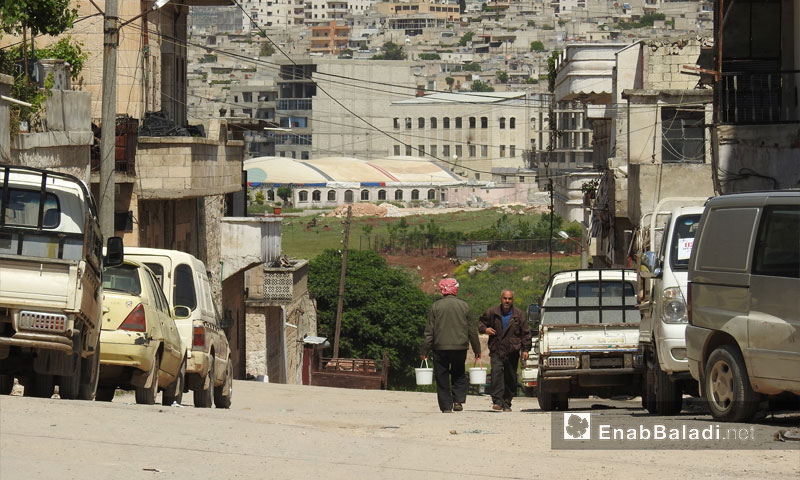“The situation stabilized and returned to natural; we have a better sense of safety than before.” “Commodities are available, and purchase is active in both forms, retail and wholesale.” These two phrases were the most repeated by the majority of Afrin’s people, speaking of the area’s situation which witnessed a Turkey-backed military operation, followed by the formation of the local councils as to provide the area with basic services.
The past a few days have witnessed the establishment of seven local councils in the area of Afrin, including the City’s Interim Council, formed in mid-April, which was followed by the councils of Bulbul, Sharran, Jindires, and then the foundation of a council in Shaykh Hadid and the city of Rajo, on the 29th of the same month.
A Workgroup Supervised the Formation Process
Yousef Neirabani, the director of the legal affairs of the local councils in the ministry of the Interim Government, said that the councils were founded by a workgroup, which was created especially for that objective, explaining that it was supervised by the “National Coalition,” the Syrian Interim Government and Aleppo Governorate Council, in addition to some of the revolutionary entities in Afrin.
The group’s members were chosen according to a process of election, conducted in the city, the conditions of which the Neirabani summarized with the following: the applicants to the executive office must be university graduates, while the local councils’ members, which consist of the community’s different components, can be high school graduates only, and, according to the workgroup’s demands, they must be registered in the personal affairs department in the area for which the member is nominated.
The number of the council’s members varies according to the city or the town; in the two cities of Afrin and Rajo, there are 20 members, while they are 15 members in the rest of the towns.
The Directorate of the Local Councils of Aleppo Governorate has directly supervised the elections, and Neirabini pointed out that the process included electoral committees and judicial censorship, providing that the councils are to start action after the adoption of the electoral records by the Governorate Council and the Ministry of Local Administration.
The local councils’ priority is the rehabilitation of the infrastructure in the area and its towns, in addition to providing the basic services, such as bakeries, electricity, water and cleaning operations, as well as brining the displaced people and the original residents to their homes and securing livelihoods to the area’s families, according the director of the councils’ affairs.
The area of Afrin constitutes of 19 administrative units, but the workgroup has agreed to form local councils for these units at the centers of the area’s seven districts, on the condition that “they achieve stability in six months.” Neirabani stressed that “the people’s return to the area will be followed by the gradual formation of local councils in all the administrative units.”
On the 20th of last January, Turkey launched a military campaign against the Kurdish “People’s Protection Units,” based on the efforts of the “Free Army”; through this operation, it managed to control the area entirely in a period of about two months.
In the past a few days, the area has received hundreds of rural Damascus’ IDPs, who settled down the Jindires camps and the area’s towns, while others were based in the city of Afrin.
Who Supports the Process?
The Deputy Director of the Afrin City Local Council Adou Nabhan said that the work “has to face many challenges in terms of suppling the area with services in the shadow of the weak resources,” pointing out in a former interview with Enab Baladi that “the priorities impose the necessity to provide the basic life needs, on top of which are bakeries, water, public roads cleaning and fuel.”
Concerning the councils’ action and support, Neirabani said that all the foundations, the directorates of Aleppo Governorate’s Council and the Interim Government, in Afrin and other areas will concentrate their attention in the upcoming area on retrieving services to the medical directorates, bakeries, the agricultural sector and the rest of services.
The Turkish government supports Afrin’s councils, as “to enable them of providing the basic services;” some humanitarian organizations and associations are working hard to accommodate the people and the evacuees, according to the director of the council’s affairs.
Ali Ma’mo, from the city of Afrin, told Enab Baladi that the councils’ formation “was an urgent need after the military operation,” pointing out that “all the governmental buildings and establishments are ready to serve.”
He called on the councils to work seriously “to release the area from fragmentation and to be perfect in terms of the services they provide,” stressing that “Afrin was not a target for shelling or destruction which the cities and towns of the northern countryside of Aleppo have witnessed before they broke from the “Islamic State” (ISIS) control, which facilitates running it.”
According to the people, the daily cleaning operations and clearing the rubble off in the city of Afrin have already started and most of the area’s markets are open. Ali wishes that the local council’s formation step “would be a base to organize the area in the best and most correct manner, as well as a guarantee for the displaced people’s return.”

